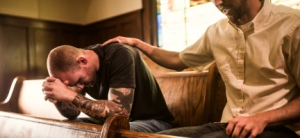12 STEPS to Recovery — STEP #9
Focus on the Recovery Process
 Recently while travelling, my wife and I were eating breakfast in a restaurant recommended by our daughter. As we sat waiting for our meal, I overheard a man, at a nearby table where a small group of men were gathered, mention the word “amends” and soon after the word “program.” Since my hearing is not the best, I heard little else of what he said. I did, however, recognize that they were men who were serious about their recovery from alcoholism or some other addiction. The clue was the man’s mention of “amends” and “program.” Both of these words are well-known by anyone who is following a 12-step program of recovery and they are not commonly used otherwise.
Recently while travelling, my wife and I were eating breakfast in a restaurant recommended by our daughter. As we sat waiting for our meal, I overheard a man, at a nearby table where a small group of men were gathered, mention the word “amends” and soon after the word “program.” Since my hearing is not the best, I heard little else of what he said. I did, however, recognize that they were men who were serious about their recovery from alcoholism or some other addiction. The clue was the man’s mention of “amends” and “program.” Both of these words are well-known by anyone who is following a 12-step program of recovery and they are not commonly used otherwise.
The word “amends” means reconnecting with people who were deeply hurt by our actions (what we have said or done). It is more than simply saying: “I’m sorry.” In short, “making amends” is to do whatever is necessary to improve relationships that were broken or jeopardized by our impropriate past behavior(s).
“Direct amends” usually means that the amends, if possible, will be in person. It is important that we consider the instruction to do so whenever possible except when they or others might be injured.
This step means that I put into action the decision and willingness of step 8 to make amends to the person(s) I have harmed. If it is not possible to do so in person, I apologize by making phone calls, writing letters, doing whatever I can to heal any damage I may have caused another person to suffer. Email or social media are not good ways to “make amends,” unless the offense was through such. Even then, it is best, whenever possible, to do so in person. Insight, courage and commitment are required. Timing is also an essential part of this step. We should make amends when the first good opportunity presents itself, except when to do so will cause more harm.
I ask God what to do and how to do it. In the last issue of the Journey to Life, I mentioned my willingness to visit my dad on the occasion of his 88th birthday and to make amends for threating to kill him when I was twenty, some thirty-five years earlier. The night before the airplane flight to see him in person, God provided an opportunity to make amends with a local church leader with whom I often disagreed. That along with my making amends with my dad proved to be amazing bridge-builders. Five years later, just before my father’s death, he told me that he prayed for me every day.
When it is impossible (such as the person with whom we need to make amends is no longer living) or people would be harmed, willingness can serve in the place of action. Finally, we take personal responsibility for our part and do not expect that the other person will respond in the way we might hope!
Ray N.
